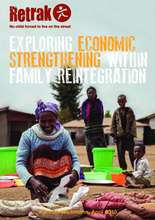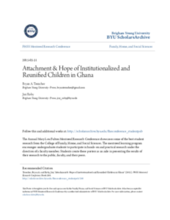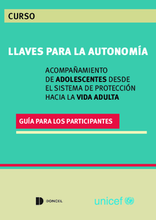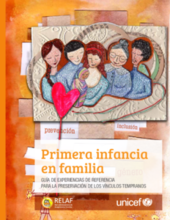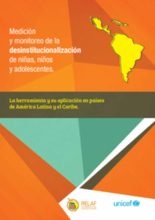Displaying 821 - 830 of 962
Work is important for promoting social inclusion, especially for marginalised or economically vulnerable populations. There is also evidence that work is associated with stability and social integration for young people who have left care.
This small research project was conceived to investigate the issues surrounding economic strengthening with Retrak Ethiopia’s reintegration programmes with the aim of seeking new ways to address the challenges.
This poster provides a brief overview of research conducted in Ghana to examine how institutionalized children’s hope for the future may be impacted by perceived social attachments.
In this article, the author, David Graham, draws comparisons between the experiences and needs of youth transitioning out of care in the UK and those of individuals who are formerly incarcerated reintegrating into society.
This report aims to provide the basis for an agenda to improve university attendance among care leavers in Australia by highlighting the nature and extent of the problem, and suggesting practical solutions within both the education and community service sectors.
This study examines the sources and kinds of support as well as the barriers to social support for a group of care leavers from a children's village in Ghana.
El presente curso surge del Acuerdo de Cooperación suscripto en 2014 entre UNICEF Argentina y la Asociación civil por los derechos de niños niñas adolescentes y jóvenes Doncel que tiene por objetivo principal contribuir a desarrollar un modelo de acompañamiento integral para adolescentes residentes en los hogares asistenciales de las provincias argentinas de Misiones, Jujuy, Chaco, Santa Fe y Tucumán en transición del sistema de protección hacia la autonomía y la vida adulta.
Esta Guía reúne una serie de programas, prácticas y políticas públicas que resultaron en la garantía del derecho a la convivencia familiar y comunitaria de niñas y niños en su primera infancia. En particular, se caracterizan por ser innovadoras o por haber obtenido buenos resultados en la protección y la restitución de este derecho. Las experiencias recopiladas abarcan programas, proyectos e iniciativas públicas, privadas o mixtas de fortalecimiento familiar, provisión de cuidados alternativos, y de reintegración familiar.
El objetivo del estudio es presentar el proceso de construcción de una herramienta para medir la institucionalización en forma rápida, a partir de información existente en los países y mostrar los principales datos que se obtuvieron.
The aim of this book is to explain to children what to expect during the time the institution in which they reside is closing.

